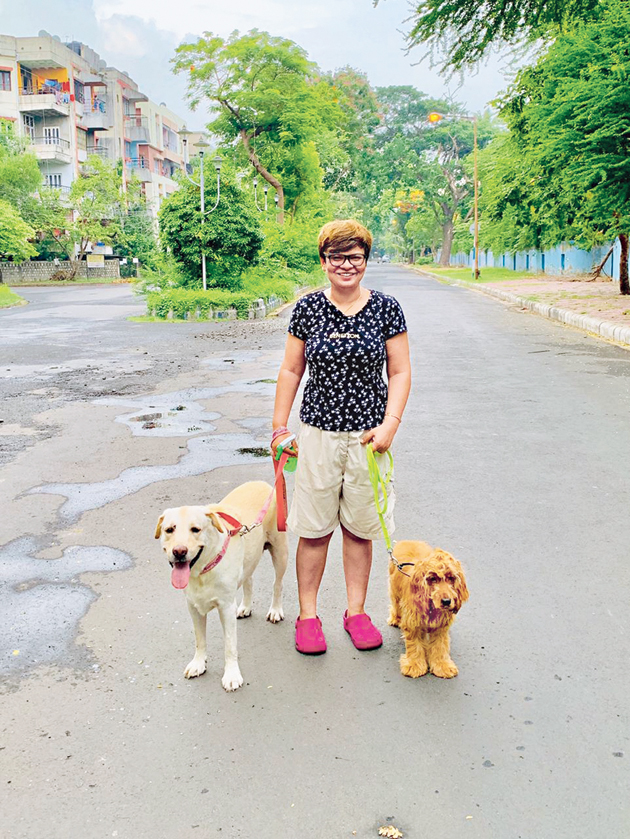From not being able to take your dogs on a walk to dealing with their frequent mood swings to rescuing dogs and puppies during lockdown, there are multiple issues to deal with for animal lovers. Paramita Das, a canine trainer and behaviourist — trained by renowned dog trainer and behaviourist Shirin Merchant and John Rogerson, a pioneer in dog training — chats with The Telegraph over phone about her journey from corporate life to pursuing her passion for dogs and also shares solutions for various problems faced by dog owners during the pandemic.
During lockdown we are not being able to take our dogs for walks. Does this affect their mood?
Dogs who are used to long walks and outdoor activities will miss going out now. Especially for younger dogs, they will have excess energy, which needs to be directed appropriately with indoor exercises that can provide mental stimulation like scenting games — Find It (with treats and toys), Hide and Seek, Retrieving and Fetch games. Also, training your dog to new commands and tricks, practising commands that your dog already knows but is doing it differently will also provide mental exercise to them. Have fun with your dog indoors and he/she will miss their walks less.
What are some of the other problems faced by dog owners during the pandemic?
The problems could range from destructive behaviour to chewing inappropriate things. Also some owners are facing challenges with toilet habits of the dogs who are used to doing their job outdoors.
Another word of caution is that while owners and dogs are happy spending so much time together during the lockdown, potential issues may arise after this period when pet parents have to go back to work in the normal routine. At that time dogs may start suffering from separation anxiety. Hence it is advisable to have the dogs spend brief periods of time on their own as well during this lockdown period.
Most pet shops are closed now. Any alternate to dog food and treats?
Balanced home-cooked meals and treats can be given. It is important to keep in mind the ingredients that are not good for dogs, like chocolates, raisins, grapes, some kinds of nuts are not to be given at all since they are toxic for dogs.
There are recipes available by pet nutritionists, which can be followed to make treats for dogs. In case the dog is on any special dog food due to any health issues, it is best to consult the vet for alternate options.
A lot of dogs are being abandoned during lockdown. How can we tackle that?
Various doctors and vets have confirmed that dogs are not transmitting Covid-19 virus. Those of us working in the canine field are constantly appealing to dog owners all across not to abandon their dogs. However, if anyone does come across a dog who has been abandoned on the streets, it is best to contact an animal welfare/rescue group who will be able to take care of the dog or advice in an appropriate manner.
What is the first thing to do if we adopt a dog who has been abandoned by previous owners?
It is important to understand if the dog has any existing behaviour issues and the new pet parents should ideally start working towards the same with a behaviourist. Also, it is very critical to start building a bond with the dog and establish trust. While it is important to spend time and build a relationship with the adopted dog, a lot of families tend to feel sorry for the dog and spend the whole day with it initially. That may create issues later on when the family has to get back to their routine, hence it is preferable to get the dog used to the regular routine of the household.
What are some of the behavioural problems of dogs that you have come across?
There can be various behaviour problems ranging like fear issues, toileting issues, separation issues, barking problems, destruction and chewing problems, and aggression (dog to human and dog to dog aggression).
Any tips for those who have a puppy at home?
Spend time building a strong relationship and bond with your puppy. Decide on the rules for your puppy like acceptable places for the dog to pee, sitting and greeting people politely instead of jumping around in excitement, not to put teeth on skin, whether allowed in the kitchen and bedroom. Teach the puppy what is acceptable behaviour and what is not by using reward-based training techniques. Socialise your puppy well before the age of 18 weeks, keeping in mind the various senses of sight, smell, sound, touch and taste so that the pup grows up to be a well socialised dog without fear issues. You may like to contact a trainer who could guide you on the same. Most important, have fun while teaching and training your puppy and ideally the whole family should be involved in bringing up a puppy to be a good canine citizen.
When is a right time to start training a dog?
Puppies start learning as soon as their senses start developing, which is when they are just a few weeks old. Hence the right time to start training is from the moment you bring them home. You start teaching the dog what is acceptable and what is not acceptable, right from the time he enters your house.
As a pup, the critical period of socialisation is up to 18 weeks of age, maximum it could be 20 weeks, hence it is good to start giving the puppy new exposure linked to the senses and initiate the toilet training indoors as soon as you bring the puppy home. Training outdoors in the open environment is to be done once all the initial vaccinations have been completed at around four months of age.
Does the behaviour of a dog get affected if not mated?
I have worked with and interacted with many dogs that have not been mated and I have not observed any behaviour issues in them. Many of them in fact have been very well-behaved dogs with no temperament issues.
Any advice for dog owners whose dogs have a biting habit?
For any biting incident, it is very important to contact a behaviourist immediately and work with them to get to the root cause of why the dog has bitten, the triggers for the same and work on a program to address the issue. Many families tend to ignore the first few biting incidents which are not desirable.
When did you decide to be a dog behaviourist?
I always wanted to work with dogs from when I was a child but finally decided to become a canine trainer and behaviourist in the year 2014.
After nearly 20 years of being a HR professional and having a corporate career that I had thoroughly enjoyed, in 2013 I started contemplating about pursuing my passion in the canine world. I then decided that I must learn the ropes of the trade from the best in the country and so I tracked down Shirin Merchant, a leading canine trainer and behaviourist and founder of Canines Can Care, Mumbai.
In 2014, I completed my first Dog Trainers course with Shirin. Over the years I went on to pursue other courses including a course on aggression and have recently completed the Professional Canine Trainer Advanced Course with her.
John Rogerson has been one of the pioneers in dog training and I had absolutely loved his book The Dog Vinci Code. So, for me it was a dream come true to attend courses with him. Being trained by Shirin and John have been the absolute highs in my life and I couldn’t have wished for any better mentors.
While shifting careers, I had thought that henceforth I would be working primarily with dogs and not so much with people. I couldn’t have been more wrong since working as a companion dog trainer, the prime thing is to work with the dog’s human family. I learnt so much more about communication, body language, team work, importance of building and strengthening emotional bonds through the training programs and working with the dogs and their families.
You have a homestay for dogs. Can you tell us about that?
When pet parents go on holidays, they leave their dogs with me and they stay with my family and me. I take on very limited bookings and I do a behaviour assessment of the dogs before taking them in because it is an open homestay and hence, I have to make sure that there would not be any issues between the dogs during their stay with me.
Your views on therapy dogs...
Dogs do give unconditional love to people and every family with a dog can vouch for how much happiness dogs bring to their lives. Studies have shown that people who own dogs and other animals are less stressed out, have fewer health problems and are in general happier people. Sigmund Freud, the father of psychoanalysis, was the first to emphasise the therapeutic value that dogs offer people. Since then, mental health experts all over the world have recognised the role dogs play in comforting, calming and soothing the suffering.
Having said that, all dogs might not be suited to be a therapy dog. So, it is very important to select the right dog as a therapy dog based on appropriate temperament testing and train the dog accordingly.











